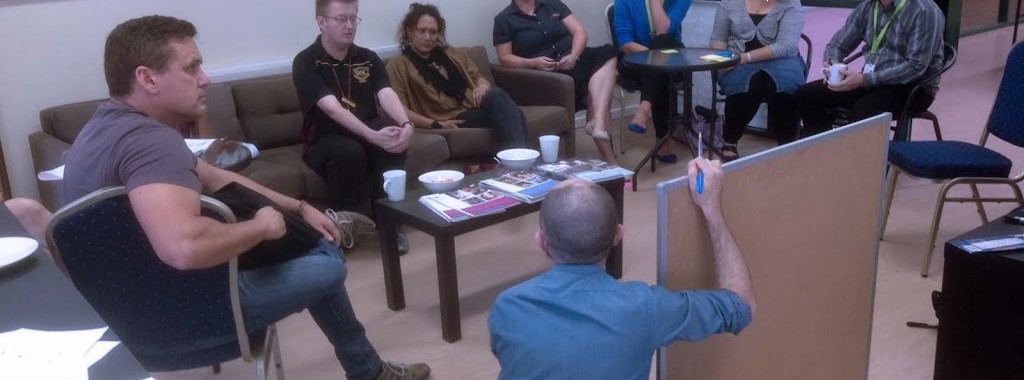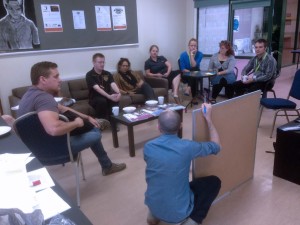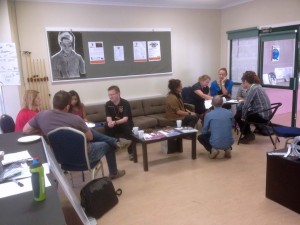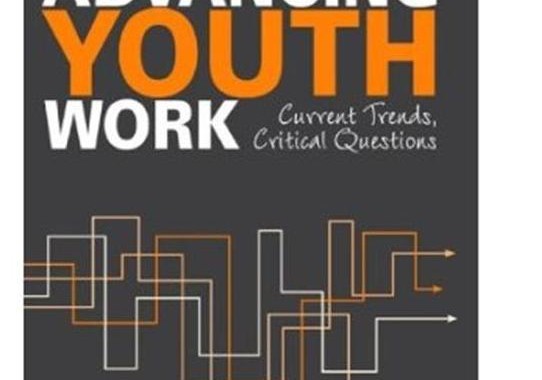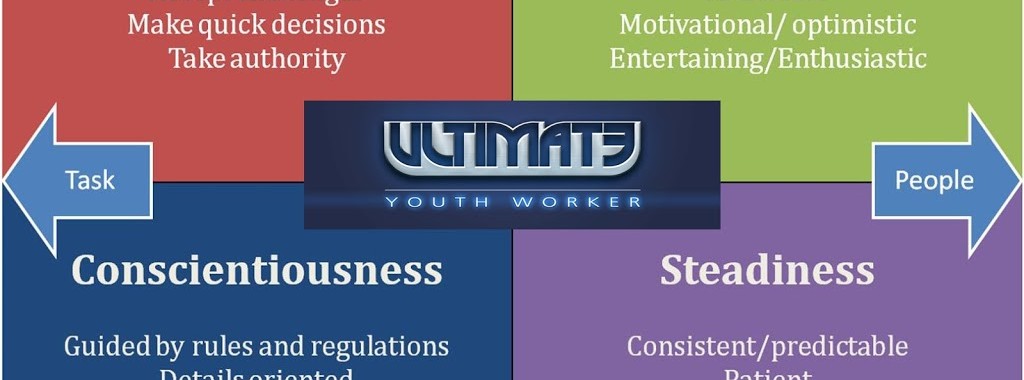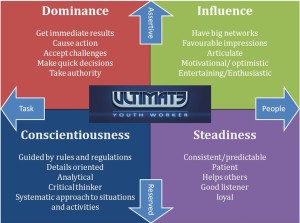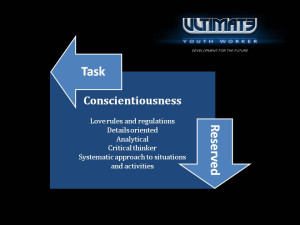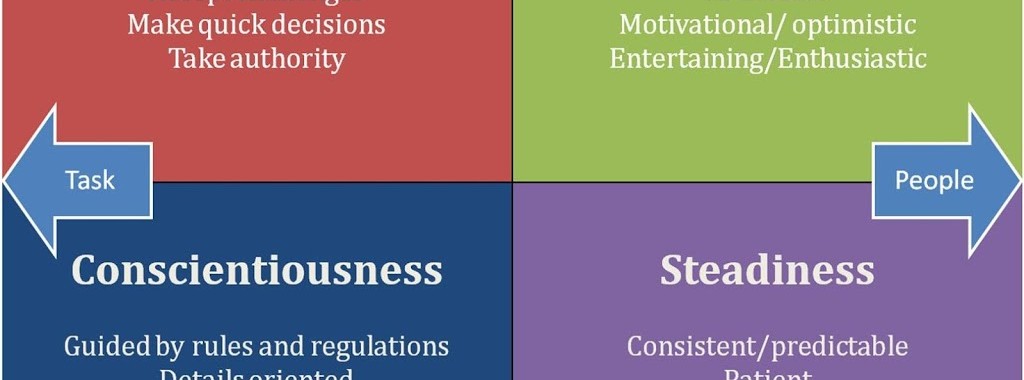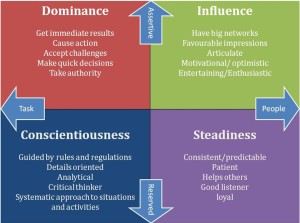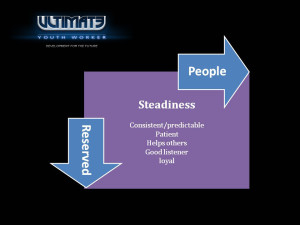Tag Archives: pillars of sucessful youth work
Become more than you are right now: A youth work specialist
If you haven’t yet, sign up for our newsletter to find out all the goings on at Ultimate Youth Worker. (Sign up here)
You can also leave us a comment below or post a comment on facebook and twitter.
What will youth work look like in 2013? The finale.
Its been a month and a half in the making but we are finally there. The finale of our series looking at the next twelve months or more in youth work. We have had blogger’s and professor’s of youth work from one end of the globe to the other. We heard from Shae and Stephen from youthworkinit.com, Sam Ross from teenagewhisperer.com, Professor Dana Fusco from CUNY and Professor Howard Sercombe from the University of Strathclyde. Each had their own perspectives on the current and future trends in youth work. Each brought a different perspective on what forces were pushing and pulling youth work. Each one had a particular pearl of wisdom for us. Today’s post is a wrap up of these posts with a focus on the similarities between them all. We will also give our view of the year ahead.
Wrap up
Our amazing guests spoke about a number of areas in which youth work will develop over the coming year. They spoke about youth worker education, technology, the economic situation and the need to be holistic in our practice.
Youth Worker Education
Dana Fusco spoke of the changes developing in youth work education world wide. In the US there has been a 900% increase over the past four years in youth development courses offered by higher education facilities. In the UK and Australia These courses are in decline. Dana laments the decline in youth work education, “In 2013, it is hard to predict where those who want to study youth work and youth studies in these countries will go. If they go into existing, related disciplines, e.g., social work, then youth work will too likely become case management; if they go into education, then youth work will become para-teaching“.
Howard Sercombe also laments the current education setting for youth worker’s. From developing a cozy little home for ourselves throughout the sixties and seventies to becoming a mainstream course in the nineties we sold our soul to the devil of higher education. Like all good corporate conglomerates the universities shafted us. Taking a subject area steeped in the tradition of practice wisdom and narrative and turning it into a McDonaldised cookie-cutter model of research-based best-practice. However true to our history we steered away from research which ultimately is leading to our higher education downfall. Conversely, Howard states, “For the first time, I can run a course for youth workers using a selection of books on youth work written by youth workers“.
Technology
In her response to the question Sam Ross states that she always thinks of the new technology on the horizon. Sam speaks of the massive uptake of mobile and smart phones by young people. She shows the statistics of American young people’s use of their phone and how much of their attention it takes…Are you on social networking sites? They are! Sam speaks of the need for youth workers to use this love of mobile technology to keep the attention of young people focused on what we want them focused on.
However Sam also implores us, “So while 2013 may be technologically more advanced and our ways of connecting and engaging may expand we shouldn’t forget that good youth work was the same in the past as it is today and will be tomorrow“. Its all about the relationship.
The economic situation
There is not a person alive today that can’t attest to the effects of the global financial crisis on the hip pocket. Everything seems to cost more today than it did yesterday. Even in countries like Australia which have had some reprieve from the tidal forces of the economic collapse the financial situation is difficult. As Howard put it “Austerity measures have required significant cutbacks in local funding and this has carried through, often disproportionately, to youth work services“. But we are not the only ones feeling the pinch. Our young people are finding employment harder to gain, University fees have shot through the roof and the general cost of business has increased significantly.
For youth workers this means difficulties at every turn. Shae and Stephen state, “Over the last 25 years, the cost of university education in the US has more than tripled, which has resulted in 1 in 11 people defaulting on their student loan repayments within two years of making payments“. Many of our guests stated that this cost was prohibitive and that if you are one of those who are entering a university to study youth work then you are likely to pay through the nose and then struggle to pay it back.
If you rely on government funding or philanthropic support to run your organisation you may be short on funds for a while. Many governments are finding their budgets significantly in the red. Many philanthropic organisations have seen their investments dip over the past few years as well and are giving out less to allow for their continuation. Its not happening everywhere yet but as Howard said, “2013 may well be the year when the expected decimation actually happens“.
The need to be holistic in our practice.
Gone are the days where youth work happens in a silo. On any given day we are expected to hold a number of roles. Sam points out that our ability to build relationships with young people is core to our work and that this foundation is what we build on in our context. Shae and Stephen point out that young people do not live in silos but have lives with intersecting and overlapping parts. Work on one without the other areas being addressed is ineffective.
Dana states, “In the United States, youth work is not a unified or singular practice; rather, it has been described, and still is, a family of practices“. Its not just the states, its world wide. We work from the same base but in different contexts. Our young people need us to have an understanding of more than how to run a good game. As copious as the needs of our young people are, the knowledge of a youth worker must equal… at least enough to refer to other professionals.
What will 2013 look like???
At Ultimate Youth Worker we have loved the guest posts over the last month and a half and have been pouring over them and a bunch of other research and have come to many of the same conclusions. Technology is going to be more important this year than ever before. 12 months on from the death of Steve jobs saw the smart phone war at its highest. Exponential growth in mobile, web and personal technology has meant that the ability to communicate or gain information has never been more accessible. Youth workers need to become more tech savvy just to survive. New web applications, social media and even the ubiquitous email are more important than ever to our relationship building. As youth workers we believe there will be a shift to online training, both formal and informal. Blogs, webinars, podcasts, university course and professional development groups are all starting to toy with developing a solid presence on the web. With the hardware never more than arms length from most young people and youth workers we need to be there.
Youth work education will need to adapt. Aside from becoming more tech enabled we need to gain more breadth and more depth in our education. Young people are changing so fast that we need to keep up with the trends. We hang our shingle on our ability to develop relationships with young people. Good. But we need to develop this skill set. We are a relatively emergent human services field and as such need to develop our purpose, values and critical approach. This is depth. We also need to gain an understanding of where we fit in the multidisciplinary field that young people now frequent. We need an understanding of who and what our colleagues in other field bring to the table. We need to understand their language, their approach and their skill sets. It is the only way we will be able to speak into their work and intervene for our young peoples best.
Money has never been more important and less relevant. The affect of the financial crisis is all around us and will continue to mess with us for years to come in ways we can’t even imagine yet. IT DOESN’T MATTER. The most effective tools in our toolkit are FREE or really cheap. Building relationships takes time. A facebook page can be accessed by free wi-fi at McDonald’s. A mobile phone plan is cheaper than ever. The tools to build relationships are time, energy and interest. Most youth workers have that in trumps. But that means we need to have them around. Youth workers need to feed their families too. With lay-offs happening throughout the sector worldwide there is fear of being cut. Like Howard says, its happened before. The cycle will return. Be the best you can be with what you’ve got and you will be one of the last to get chopped.
Be more!!! Be holistic. What do you do when you have that relationship? We believe youth workers need to see young people as whole people in their context. We need a biopsychoscialspiritual focus. We need to understand the person, their context and their pathways out of their situation. We need to support our young people in every way we can. We also need to look after ourselves. As the stress builds and we are asked to become more and do more we need to have the reserves to keep going.
We also agree with Dana and Howard, Now is the time for an international presence developing the practice of youth work. We are seeing great international youth work research, texts, blogs, conferences etc coming to the fore. We need to build on this.
2013 holds possibilities and risks. We have tried to play it safe for the last decade or more and have seen the rug being pulled out from under us. No more politically light weight youth work. We must band together and do it differently or we will see the death knell of what we hold dear… relationally based critical youth work.
Survival plan for the stressed youth worker.
Food, Fire, Shelter and Water
Food
In the wilderness that is youth work our food is usually the “food for thought”. We need to fill our minds with knowledge…food for thought. Like real food we can go a substantial period of time without it, but it does provide us with sustenance for the journey. Read a book, a blog or even a journal. Do a course, attend a seminar or a webinar. If all else fails have a coffee and a chat with a bunch of colleagues about a topic that has some meat.
Fire
Shelter
Water
Remember: Prior Preparation Prevents Poor Performance.
If you haven’t yet, sign up for our newsletter to find out all the goings on at Ultimate Youth Worker. (Sign up here)
You can sign up to have our blog posts sent straight to your email by adding your email to the subscribe button on your right, or click here.
You can also leave us a comment below or post a comment on facebook and twitter.
Read a book.
So with the myriad of books out there how do you get a good one???
-
Look for three great ideas
-
When you come across a book in a shop dont just grab it because the title was good. Don’t grab it because you like the look of a couple of chapter headings flick through a few of the pages and find three great ideas. What you consider a great idea may not be the same as the next person but three makes sure you are getting a top read. For me its looking for three ideas I can impliment immediately in my own practice.
-
-
Check out the most recommended books on amazon.com
-
There are millions of books on amazon and at the time of this post there were 25,693 books which came up when I typed in youth work to there search engine. But don’t stop there. Read widely! Look at counselling skills, mental health, group work or any number of other areas of practice.
-
-
Check out a reputable review of books
-
If you are a team leader or a manager the guys at ManagerTools run a book review on their site. If you are in Australia the Australian Clearinghouse for Youth Studies has a monthly newsletter which also has a book review. If you are in Youth Ministry the crew at Youth Specialties provide regular book reviews of up to date books as well as a number of really cool resources. Here is one we recommend:
-
Don’t forget to sign up for our newsletter and you will be kept up to date on all the goings on at Ultimate Youth Worker. Just add your details to the form at the top right of this page it’s all you need to do.
You can also sign up to have each of our blog posts sent straight to your email by adding your email to the subscribe button on your right.
And by all means leave us a comment below or post a comment on facebook and twitter. It is a supportive community that makes us Ultimate Youth Workers.
Deep engagement in youth work
If you haven’t yet sign up for our newsletter, find out all the goings on at Ultimate Youth Worker by signing up using the form at the top right of this page. It is all you need to do.
You can also sign up to have our blog posts sent straight to your email by adding your email to the subscribe button on your right.
You can also leave us a comment below or post a comment on facebook and twitter.
Observe the C in DISC for youth worker’s
A high level of CONSCIENTIOUSNESS can lead to giving in to avoid conflict. They can be slow to act and do not see the forrest for the trees. They see the problems and can be critical of others. To make a decision these guys need every piece of information and every avenue of thought to be addressed… even then if there is any risk they may not act. They are thorough and persistent. They are matter-of-fact which can come accross as abrasive.
Here are our top seven tips for working with people with CONSCIENTIOUSNESS behavioural traits:
-
Give clear expectations and deadlines: If you want a decision tell them that. Be clear about the time frame too. Don’t extend your timeline be clear that a decision needs to be made and when you want it done by.
-
Show dependability: Let them know that you depend on their work and that they can depend on you to support them.
-
Show loyalty: Back them whereevr you can. These guys don’t like conflict so will not argue with you if you go against them, they will just withdraw. If you can, Show them you are on their side.
-
Be tactful and reserved: Even if you are going to go with another idea be supportive of them. They are not party animals so tone it down and focus on their knowledge and expertise.
-
Honour precedents: If something has worked in the past and they bring it to your attention try to run with their idea. If there is a rule in place, even if it is unwritten, be aware and open to following it.
-
Be precise and focused: this is similar to number one, however is more about how to do it. Do not leave any ambiguity. Be clear consice and if necesary say it twice. Set SMART goals and require them to report on their actions. Send your request in an email… they’ll love it.
-
Value high standards: These guys expect perfection and then attempt to deliver it. When they want to have it perfect but you have a short timeframe express your thanks for their standards but explain the need for brevity. Hold it in high regard. Praise them for their effort. Let them know you still expect the highest possible quality within the timeframe.
Some well known high CONSCIENTIOUSNESS behaviour holders you may know and have seen.
If you haven’t yet sign up for our newsletter to find out all the goings on at Ultimate Youth Worker. The form at the top right of this page is all you need to do.
You can sign up to have our blog posts sent straight to your email by adding your email to the subscribe button on your right.
You can also leave us a comment below or post a comment on facebook and twitter.
Accountability through ongoing learning
 |
| A way to get your professional learnings right on your phone, tablet or computer |
If you haven’t yet sign up for our newsletter to find out all the goings on at Ultimate Youth Worker. The form at the top right of this page is all you need to do.
You can sign up to have our blog posts sent straight to your email by adding your email to the subscribe button on your right.
You can also leave us a comment below or post a comment on facebook and twitter.
Observe the S in DISC for youth worker’s
Here are our top five tips for working with people with STEADINESS behavioural traits:
-
Be logical and systematic: These guys struggle with priorities and systems but they need to have a plan of action, otherwise they would spend all day around the watercooler or at a cafe chatting about your life. set clear boundaries and timelines for task completion.
-
Provide a secure environment: They do not like change! Make their environment as predictable as you can. Do not ask them to change thier password, move desks, do a rush presentation or lead a project that needs a quick resolution. Make them feel safe.
-
Tell them about change early: If there needs to be a change, pre-wire them early. Give them a heads up. Provide time for them to become comfortable with the idea of change. Walk them through it step by step and address their concerns.
-
Show how they’re important: If they do something great. Minimise your appreciation in public and be as sincere as possible in private. They struggle to feel their work is important so explain how they have made a difference.
-
Teach them shortcuts: If you let them run the show it will take two days to make a cup of coffee! The conversations will take up all their time. They want consensus and a clear picture of everything that needs to be done. The key thought here is do not make the perfect the enemy of the good.
Some well known high STEADINESS behaviour holders you may know and have seen.
Why youth worker’s need to embrace technology for professional development
With new technology coming onto the market every minute you would hope youth worker’s were at least keeping up, sadly if anything we are falling behind at an ever increasing speed.
With new technology coming onto the market every minute you would hope youth worker’s were at least keeping up, sadly if anything we are falling behind at an ever increasing speed.
-
Our organisations. Organisational policies and procedures have become quite stringent as a knee-jerk reaction to possible legal and ethical issues which arise from the use of technology
-
Technology is changing so fast it is hard to keep up. If you do not devote time to seeing what is out there you can not keep up to date.
-
Technology costs money. I worked in an organisation two years ago that were still running windows ME on their computers which were ten years old!!!
-
It is not seen as a priority compared to face to face interactions with young people. Every day in Australia young people aged 15 and over spend approximately two and a half hours on the Internet. That is more than they spend with me as their youth worker!
So if it is important to our interactions with young people we should learn a bit about it right???
Here are a few reasons this can and should change.
-
Web based training is cheaper than other forms available. If and average worker is on $20 and hour and they attend a half day seminar that goes for 4 hours it costs the organisation $80 before they even get there. lets say it is in a major city and your organisation is in the outer suburbs, roughly an hour each way by transport is another $40 in lost productivity. Train tickets or petrol =$$$. Then there is the cost of the training. Is it catered, add more money. The average half day seminar in Melbourne currently goes for around $120.
- The equation looks a little like this:
- Conference attendance/lost productivity = $80
- Transport/lost productivity = $40
- Transport costs = $???
- Parking = $???
- Seminar cost = $120
- Catering = $???
- Total cost =$240+transport
- Same seminar done online =$200 (no transport costs, no catering etc.)
-
It is easier to attend. If your seminar is from 10am-2pm you can get to work at 9am and spend an hour catching up on emails. at 2pm when the seminar finishes you grab a bit to eat and are back at your desk by 2:30pm (and you had a snack or two at your desk while you were at the seminar). All you need is a computer with Internet access and a headset with a mic. Also you can attend training on the otherside of the world with great trainers just by getting online…No need for a $1000 plane ticket.
-
Online seminars provide handouts etc online. Whether you are at a webinar, listening to a podcast or watching a pre-recorded PowerPoint most providers also give you access so that you can go again and print/save documents for future reference.
-
Your boss won’t think you are playing hooky. From our experience we have found that many bosses struggle with sending staff to PD because they have issues with trusting that you will be there the whole time and actually pay attention. It is usually not because you have given them a reason but they are remembering what it was lie for them. If you are in your cube or office and you are visibly doing your training then there is no reason to doubt you.
So what does this mean for you as a youth worker?
Aaron
